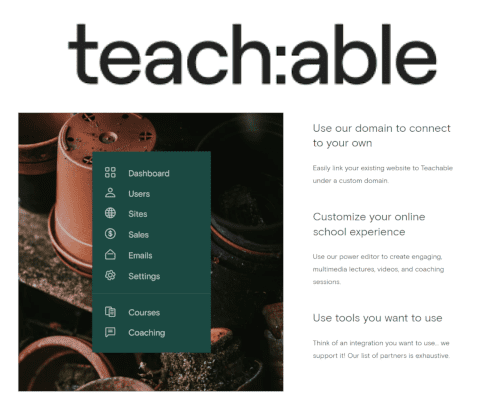Our content is reader supported, which means when you buy from links you click on, we may earn a commission.
How Matt Ting Earns $30 to $40K/Month in the Corporate Finance and Professional Services Market

- Who: Matt Ting
- Website: peakframeworks.com
- Course Topic: Finance and investing
- Interesting Stats: 25k YouTube subscribers after two years
Who are you and what course have you created?
My name is Matt Ting and I’m the founder of Peak Frameworks! I grew up in Canada and spent several years working in investment banking and private equity in New York.
Our courses help people break into private equity, investment banking, and corporate finance. The courses cover everything a candidate needs to know, including financial modeling, interview questions, case studies, and recruiting strategy.
What market does your online course serve?
Our online courses serve the corporate finance and professional services market. Our customer base includes investment bankers, consultants, university students, and other professionals looking to make a career switch (lots of accountants). We also have a couple of corporate clients where we help train the incoming staff of investment firms.
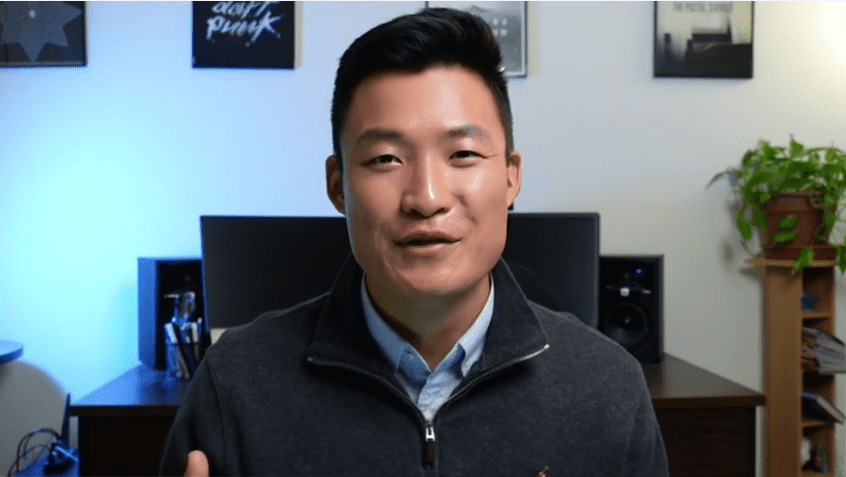
What’s the biggest benefit of taking your course?
Our courses provide detailed and actionable ways for people to get jobs in private equity and investment banking. Our financial models are based on what firms use for their live deals. Our case studies come directly from the largest investment funds in the world. We’re fortunate that our students have a very high success rate when it comes to getting the job they want.
The Peak Frameworks team is also made of industry professionals who are still deeply involved with recruiting and hiring, so we are constantly updating the material.
How did you get into the market?
I worked in the finance industry for several years and saw that there was a big gap between people’s expectations and what the actual interview process was like. Most people in finance have a pretty confidential approach to information – funds don’t like sharing their secrets and most of the big online personalities keep their identities secret.
When I was recruiting, I used lots of different materials when trying to prepare, but most of them were a bit inaccurate or outdated.
After I broke into the industry, I ended up tutoring and coaching people on the side.
Over time, my recruiting study notes ended up being used by lots of people who were interviewing. I then realized I was serving a need that really resonated with people. - Matt Ting Click To TweetWhy did you decide to create an online course in the first place?
Well, I really enjoy teaching and making content, so an online course felt like the perfect way to share what I had learned while working in finance. I have a long history of making written guides (university notes, video game walkthroughs, online blogging) and get real satisfaction from teaching other people.
I also read the 4 Hour Work Week years ago and it planted the idea of digital entrepreneurship in my mind. Digital content seemed like the best way for me to run a solo business while being remote and building on existing skills.
Did you have any moments of doubt before you created/launched it?
The first course I launched was a resume course, which initially did very poorly. I used it as a prototype as I learned how to do video editing and got comfortable with online teaching. It got very few sales, which spooked me into thinking that the entire online courses market was way too saturated. In hindsight, I think the pricing was off (too high) and there wasn’t very good social proof for the business. The website also looked much jankier back then.
When the resume course initially flopped, I was already mid-way through making the private equity course, so I decided to finish it. I was going to base my decision to continue Peak Frameworks on the success of the private equity course. It ended up performing pretty well and I’ve stuck with the business.
What’s your online course like?
The course is a combination of video, PowerPoint slides, financial models, exercises, and case studies. The videos are generally either me walking through an Excel model, PowerPoint slide, or giving a sample answer by talking to the camera. The courses also have a supplementary Q&A guide that has lots of interview questions that customers can use for self-study. I also send regular e-mails about what I’m hearing with regards to recruiting timelines and other industry trends. There’s also a comments function where I answer customer questions.
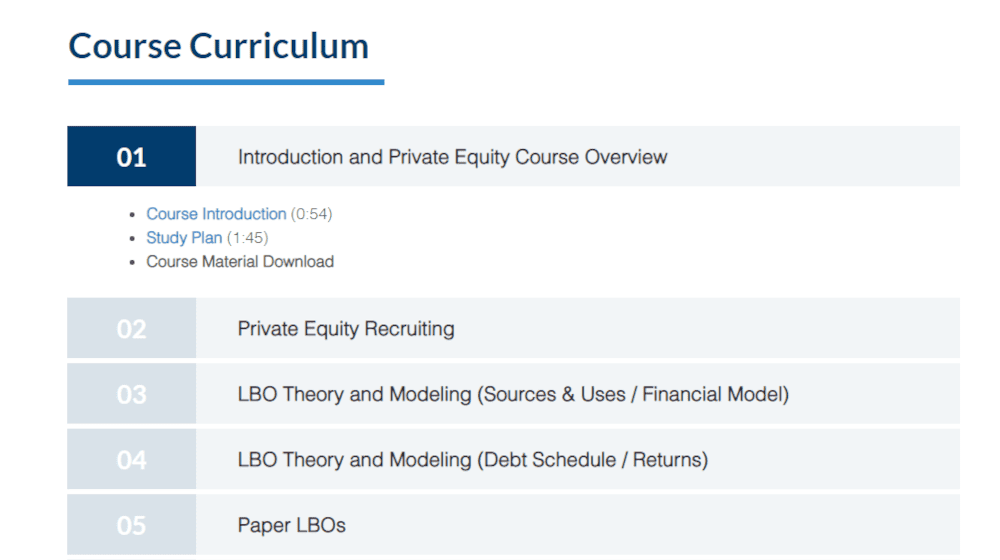
How long did it take you to create your course?
The private equity course probably took me 3 or 4 months to make the first draft. Subsequent updates have taken generally a few weeks to a month. The investment banking course took me about 4 or 5 months to make. I’ll generally draft out the curriculum then slowly start chipping at the slides, which form the basis of the videos. After the slides are done, I’ll record all of the content and then edit it down. These courses have 7-10 hours of content each. I design the sales page myself in Wix and also handle all the digital marketing.
Tell us a little about the process of launching your course and getting your first sale(s).
I’m a total marketing novice so I didn’t really have a very good strategy for the first launch. I just pushed it out on Instagram and my online blog to address my immediate contacts. Luckily, I did a lot of tutoring/school community work, so there were some younger alumni from my school and the previous employer who picked up the course. I very, fortunately, ended up getting 3 sales my first day, which was probably one of the greatest feelings in the world.
Do you have a lead magnet?
I have a few lead magnets that are offered through YouTube videos and our online blog. We offer a free cold e-mail template, preview of the course, Excel formatting sheet, and datasheet for target school placement. Sign-ups then receive an e-mail flow based on the lead magnet they selected. The email flow will contain a sales pitch for one of our courses.
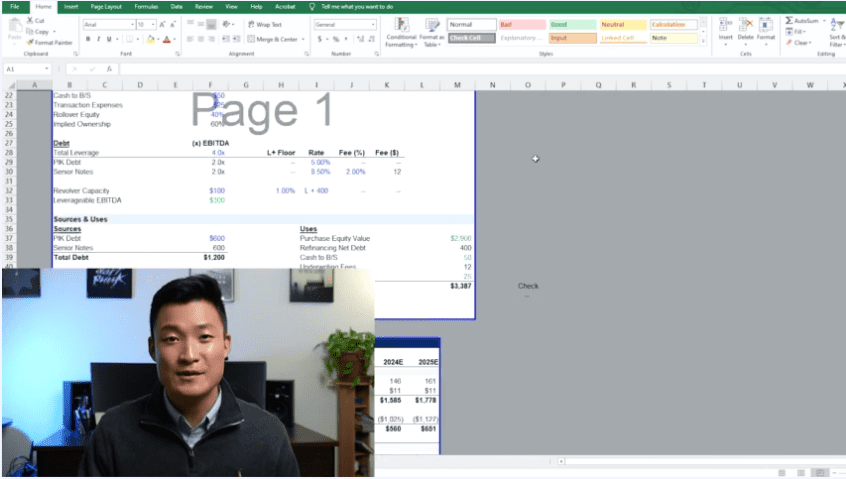
What’s the traffic strategy that works best for you?
YouTube is the most reliable social media platform for us and is where we got our start. About a third of our customers come from this channel and the algorithm is strong enough that it grows fairly organically. We had 25k subscribers on YouTube at the end of 2021 (we started our channel in early 2020).
SEO also became a lot better for us in our second year. It takes a lot of time to build good blog content and have it rank, but our top posts bring in tens of thousands of clicks per month.
We did paid Instagram shoutouts, but the ROI for it has slowly decreased over time. The financial services niche has gotten a lot more crowded on Instagram.
What online course platform are you using?
We use Teachable for the course part and use Wix for the rest of our website (including blog and sales pages).
Check Out Teachable
Teachable is one of the top online course platforms used by successful course creators interviewed on coursemethod.com. It is easy to set up and build your site pages, and the course area looks great.
- Price Range: $0 (+ transaction fees) to $299/month
- Most Popular Plan: Pro Plan at $119/month
- Annual Discount: Yes, take 17% off!
- Free Trial: Try out Teachable’s core features for free
Do you like it?
Both Teachable and Wix are adequate. I mostly don’t plan on switching because it’s such a hassle. If I could restart, I would probably pick at least Teachable again. Kajabi seems like a marginally better platform than Teachable (seems more customizable, nicer sales page feature, seems to have more professional schools), but Teachable gets the job done. I think the key lesson for me was to not rely on the course provider for all jobs – all the course providers have really bad website design when you compare to the actual website design solutions like Wix, Squarespace, and Webflow. Most of the course providers are good at the course stuff, but all their other features are below average.
If I were to restart the redesign of my full site, I’d probably do Webflow. Wix and Squarespace are excruciatingly slow on mobile. I didn’t realize it, but Wix is kind of a laughing stock in the web dev community.
Are there any features you wish it had?
I really wish they had a built-in PDF stamper or did more to prevent piracy. Piracy is definitely the number one issue in courses (and content in general) and it doesn’t seem like they do very much to prevent it. I can’t monitor when accounts are used by multiple IPs and they don’t have any tools to help prevent resource sharing.
There are some other small qualities of life things I wish they would add:
- A better quizzing function (something like flashcards or randomized questions)
- Cleaner download function (it’s pretty ugly)
- Easier for creators to do bulk uploads (it’s really manual and unintuitive)
- Ability to customize the checkout page (it’s really clunky to bundle things and offer multiple pricing plans on the same sales page)
- Ability to customize more parts of the site (e.g. you can only pick one color font for links on the entire Teachable site)
But most of those things don’t move the needle that much. I think the Teachable company is also good enough they’ll probably make it better over time.

What made you decide to use your chosen platform over others?
I initially chose Teachable because it was the cheapest option and had slightly better reviews than Thinkific. It also seemed like there were more legitimate schools on Teachable. Kajabi seemed way too expensive when I was just getting started. I’m grandfathered in on the old Teachable price though. I did consider switching to Thinkific briefly because their web pages looked a bit nicer, but decided it wasn’t worth the hassle.
I chose Wix because it was cheaper than Squarespace and the website editor is really intuitive/easy to use.
What other tools do you use to run your online course business?
I use Mailchimp but I don’t really like it. The UI is really poorly designed, the customer service is generally unsympathetic, and they just raised their prices by like 30%. I’m kind of too lazy to switch, but I’ll probably try ConvertKit over the next year.
- I use Zapier to connect Mailchimp and Teachable for email signups.
- I use ImprovMX for a free e-mail domain. I registered my domain name with Google domains.
- I pay for FB ads, mostly to retarget customers who have clicked on one of our pages.
- I use a company called Firma to do foreign exchange since our revenue is USD but the salary is CAD.
- I recommend anyone who’s cross-border USD / CAD to also get a double bank account with BMO Harris (on the US side) and BMO in Canada. BMO Harris is I think the only US bank that will open a US bank account for you without a physical US residency (if you’re in Canada).
- I still do my accounting in Excel – I tried using Quicken but Excel just feels more flexible still.
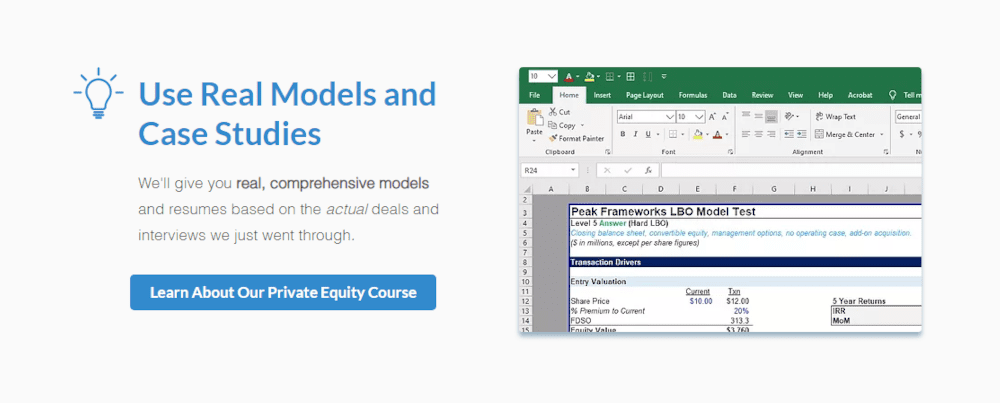
What books or training programs have you found useful on your journey to a successful business owner that others might find valuable too?
Honestly, nothing really. I think I need to focus more on becoming a better business owner and seek out those resources. I’ve tried advertising courses on how to do Google / Facebook ads, but haven’t derived a ton of value out of them.
Do you have any big mistakes you’ve made along the way that you’d be willing to share?
Well, the first big mistake I had was framing the market. I think when you’re starting out, you can only envision yourself when you think of what a target customer is like. In actuality, your product is probably going to speak to a much wider set of people, but you’re going to be severely biased by your own experiences.
For example, I always did the potential revenue / TAM calculation for finance courses as however many people are in the industry per year. However, there are tons of aspirational people trying to switch from different industries, students who are still a couple of years out from recruiting/exploring what they want to do, and finance-adjacent people who just want to deepen their exposure (like operations people at a PE-backed company or a corporate lawyer).
Another big mistake I had was being too frugal with spending. I think I was more concerned about what my take-home salary would be in my first two years because I was evaluating whether it would be a viable career path. In hindsight, I should have reinvested more into the business, specifically focusing more on paid ads and outsourcing work. I should have hired a video editor for YouTube videos a long time ago.
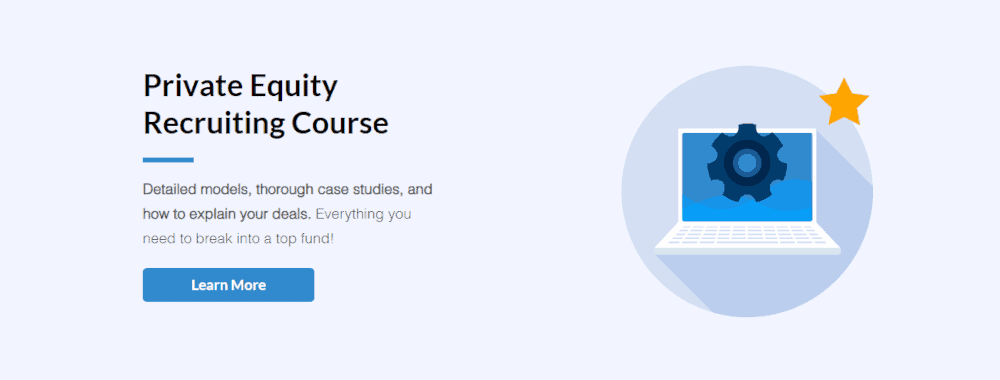
Please share some idea of revenue.
Our courses are a bit cyclical (with recruiting timelines and annual school years), but the average monthly revenue is about $30-$40k.
Please tell us a little about what the money you’ve earned from your course has done for you.
I think courses gave me a very flexible way to live my life. I was able to do remote work/travel for extended periods over the past few years. Peak Frameworks has also given me the confidence that I’ll always be able to earn money if I need to.
In addition to revenue are there any numbers you would like to share?
For YouTube, I think the key is finding an audience that really resonates with your content. You need to be delivering a high amount of value to at least some people. If you can’t get to 1,000 subscribers either your video quality is too low or your content isn’t quite there yet. I got off the ground by posting to Reddit and Facebook groups (r/financialcareers, Subtle Asian Investors). The YouTube algorithm is also really strong, it’ll do most of the work for you.
We got 25k YouTube subscribers after two years (15k after our first year). Our mailing list probably has 3k subscribers. Our website got 30k monthly viewers at the end of 2021.
What has creating your course done for you personally?
Creating a course has confirmed to me that I really enjoy making content. I love working for myself and I definitely want to do some form of entrepreneurship for the rest of my life. Doing this particular kind of business has also given me so much free time that I’m able to explore other hobbies. I spend close to an equal amount of time working on Peak Frameworks that I do producing music.
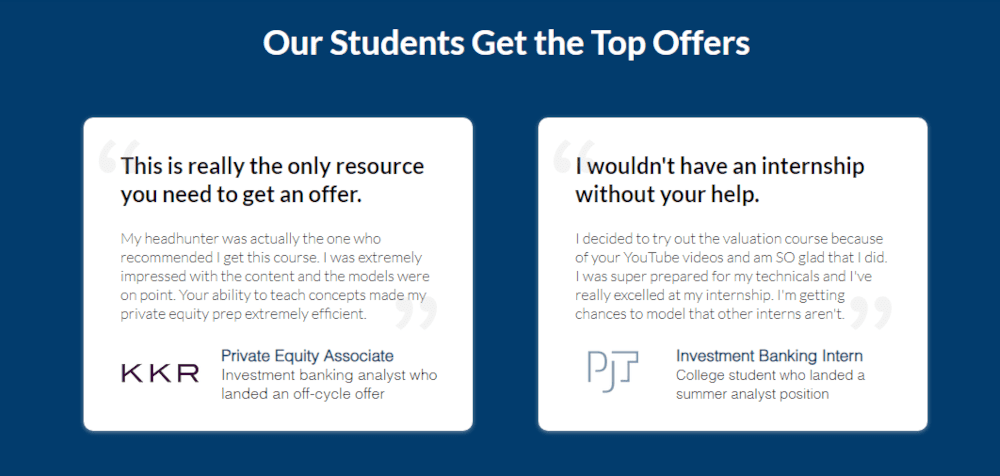
Do you have a story of a transformation from any of your clients?
We’re fortunate to have a lot of successful customers who end up getting their ideal job after using a course of ours. I think we’re very lucky to have a product that resonates with customers as I get a warm e-mail every week or so and our NPS score is very high.
One memorable story comes from an early student of ours who went to a non-target school that didn’t study business. He was planning on becoming an optometrist but had a change of heart in his junior year of school and was really worried because he didn’t have any business experience. He found our courses through our YouTube videos and ended up reaching out to me. We did a couple of sessions and he registered for our private equity course. I got an e-mail from him earlier this year and learned that he got a private equity job out of school (extremely rare) and paid down all his college debt with his first bonus. Hearing that felt great.
What advice do you have for people just starting out?
Just make sure to actually start.
Start with a small step that gets you going. - Matt Ting Click To TweetI always tell people to register the website domain name because lots of people get hung up on finding the perfect name. Once I picked a name, I felt a lot more motivated to do work.
Also, I think that most professionals are definitely smart and hardworking enough to start their own successful business. It’s more about getting comfortable with some ambiguity and risk.
